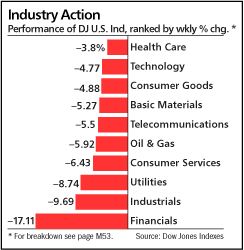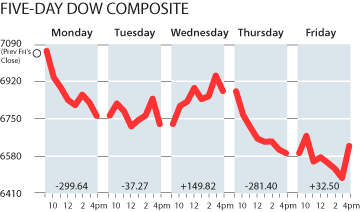
May 15 (Bloomberg) -- General Electric Co. may sell or seek a partner for the unit that makes refrigerators and washers, ending more than a century in an industry that helped make GE a household name, people familiar with the situation said.
GE, the biggest maker of appliances for new U.S. homes, hired Goldman Sachs Group Inc. to explore options that include a spinoff or auction, according to one of the people, who declined to be identified by name. A sale may bring $5 billion to $8 billion, the Wall Street Journal reported yesterday.
Chief Executive Jeffrey Immelt, who took over from Jack Welch in 2001 and surprised investors with a decline in profit last quarter, has been paring consumer businesses to cope with a slower U.S. economy. The units he's selling don't expand fast enough to help GE reach its goal of 10 percent annual profit growth. Appliances, which like light bulbs are the GE products most familiar to consumers, accounted for about $7.2 billion in sales last year, or just 4.1 percent of the 2007 total.
``We would positively perceive a more aggressive approach to selling off slow-growth businesses,'' Robert Schenosky, a New York-based analyst with Jefferies & Co. who rates the shares ``hold'' and doesn't own any, said in an interview.
Prices for some appliances haven't increased in more than half a century. In 1953, an 11-cubic-foot refrigerator was advertised for more than $500. Today, an 18.2-cubic-foot GE model lists for as little as $519 on the NexTag.com shopping site.
Gary Sheffer, a company spokesman, declined to comment on a possible sale. Fairfield, Connecticut-based GE rose to $32.73 at 9:07 a.m. today in New York, after closing at $32.51 yesterday in regular New York Stock Exchange composite trading.
Housing Slump
U.S. home foreclosure filings climbed 65 percent in April amid a subprime mortgage crisis. Home prices fell the most in 29 years last quarter, making it tougher for homeowners to refinance loans or borrow more money to buy goods such as refrigerators.
Louisville, Kentucky-based GE Appliances accounted for about 13,000 of GE's 327,000 employees as of the end of last year.
``This isn't a piece of business at this point that has got much more incremental opportunity for GE,'' said Nicholas Heymann, an analyst at Sterne, Agee & Leach Inc. in New York, who has a ``hold'' rating on the stock.
Since unveiling his basic plan to shift out of economically sensitive sectors in December 2002, Immelt has divested more than $75 billion in GE businesses, including the plastics and insurance units, while making more than $50 billion in purchases in faster-growing areas such as water treatment and aviation. Investors and analysts have been asking ever since whether he planned to shed appliances and the light-bulb unit.
In December 2007, Immelt put the U.S. private-label credit card division on the block and is also selling the consumer finance unit in Japan, called Lake.
Earnings Surprise
GE's shares fell 13 percent, the most in two decades, on April 11 after Immelt reported a 12 percent decline in first- quarter earnings and said annual profit would trail his $2.42-a- share target. GE changed its forecast to $2.20 to $2.30 a share.
Welch told the GE-owned CNBC network that the surprise had jeopardized Immelt's ``credibility'' and later followed up to reiterate his support for the CEO. Welch had divested the small- appliance business, which made products such as toasters, and consumer electronics in the 1980s.
Since its inception in 1892 through the merger of the Edison Electric Co. and the Thomson Houston Co., GE was usually first to introduce appliances, from the room air conditioner to the two- door refrigerator-freezer combination, according to its Web site.
In 1928, GE introduced the Calrod electric range and about 19 years later came out with the first completely automatic clothes washer. In 1969, it introduced the first side-by-side refrigerator-freezer with an ice and water dispenser in the door.
Valuation
A sale would continue consolidation in the U.S. appliance industry and provide a possible vehicle for overseas companies looking to grab a larger share of the U.S. market.
Sterne Agee's Heymann told Bloomberg Television today he expects the sale may fetch about 9 times earnings before interest, taxes, depreciation and amortization, or about $6.5 billion. Goldman Sachs analyst Deane Dray, in a research note, said reported estimates of a possible value for the deal range from 8 to 12 times Ebitda. Dray rates the stock as ``neutral.''
The biggest recent acquisition of an appliance company was Whirlpool Corp.'s purchase of Maytag Corp. in 2006, creating the world's biggest appliance maker. The final sales price excluding assumed debt was $1.68 billion, or about 8.4 times Maytag's Ebitda in its final four quarters, according to Bloomberg calculations.
Appliance Makers
Haier Group, China's biggest appliance maker, was one of the unsuccessful suitors in the bidding for Maytag. South Korea's LG Electronics Inc. and GE said in February they would share patents on cooking appliances and refrigerators. Sally Lee, a spokeswoman for Seoul-based LG Electronics, declined to comment on the GE report, as did Zhao Rui, a spokeswoman at Haier Group in Qingdao.
``Haier would definitely be interested because they've been trying for years to get a bigger share of the U.S. market,'' said Zhang Xiaoga, an analyst at Orient Securities Co. in Shanghai. He has an ``add'' rating on the company's Qingdao Haier Co. refrigerator and air conditioning unit listed in Shanghai.
Stockholm-based Electrolux AB, the maker of Frigidaire appliances, in April reported its first quarterly loss in more than two years because of the slowdown in the U.S. Electrolux spent 120 million kronor ($20 million) in the first quarter to introduce new products in the U.S.
Royal Philips Electronics NV, Europe's largest consumer- electronics maker, has said it is looking for acquisitions to build its appliances division. The company raised 680 million euros ($1.05 billion) earlier this year when it sold a stake in its liquid-crystal display venture with LG.
GE, the biggest maker of appliances for new U.S. homes, hired Goldman Sachs Group Inc. to explore options that include a spinoff or auction, according to one of the people, who declined to be identified by name. A sale may bring $5 billion to $8 billion, the Wall Street Journal reported yesterday.
Chief Executive Jeffrey Immelt, who took over from Jack Welch in 2001 and surprised investors with a decline in profit last quarter, has been paring consumer businesses to cope with a slower U.S. economy. The units he's selling don't expand fast enough to help GE reach its goal of 10 percent annual profit growth. Appliances, which like light bulbs are the GE products most familiar to consumers, accounted for about $7.2 billion in sales last year, or just 4.1 percent of the 2007 total.
``We would positively perceive a more aggressive approach to selling off slow-growth businesses,'' Robert Schenosky, a New York-based analyst with Jefferies & Co. who rates the shares ``hold'' and doesn't own any, said in an interview.
Prices for some appliances haven't increased in more than half a century. In 1953, an 11-cubic-foot refrigerator was advertised for more than $500. Today, an 18.2-cubic-foot GE model lists for as little as $519 on the NexTag.com shopping site.
Gary Sheffer, a company spokesman, declined to comment on a possible sale. Fairfield, Connecticut-based GE rose to $32.73 at 9:07 a.m. today in New York, after closing at $32.51 yesterday in regular New York Stock Exchange composite trading.
Housing Slump
U.S. home foreclosure filings climbed 65 percent in April amid a subprime mortgage crisis. Home prices fell the most in 29 years last quarter, making it tougher for homeowners to refinance loans or borrow more money to buy goods such as refrigerators.
Louisville, Kentucky-based GE Appliances accounted for about 13,000 of GE's 327,000 employees as of the end of last year.
``This isn't a piece of business at this point that has got much more incremental opportunity for GE,'' said Nicholas Heymann, an analyst at Sterne, Agee & Leach Inc. in New York, who has a ``hold'' rating on the stock.
Since unveiling his basic plan to shift out of economically sensitive sectors in December 2002, Immelt has divested more than $75 billion in GE businesses, including the plastics and insurance units, while making more than $50 billion in purchases in faster-growing areas such as water treatment and aviation. Investors and analysts have been asking ever since whether he planned to shed appliances and the light-bulb unit.
In December 2007, Immelt put the U.S. private-label credit card division on the block and is also selling the consumer finance unit in Japan, called Lake.
Earnings Surprise
GE's shares fell 13 percent, the most in two decades, on April 11 after Immelt reported a 12 percent decline in first- quarter earnings and said annual profit would trail his $2.42-a- share target. GE changed its forecast to $2.20 to $2.30 a share.
Welch told the GE-owned CNBC network that the surprise had jeopardized Immelt's ``credibility'' and later followed up to reiterate his support for the CEO. Welch had divested the small- appliance business, which made products such as toasters, and consumer electronics in the 1980s.
Since its inception in 1892 through the merger of the Edison Electric Co. and the Thomson Houston Co., GE was usually first to introduce appliances, from the room air conditioner to the two- door refrigerator-freezer combination, according to its Web site.
In 1928, GE introduced the Calrod electric range and about 19 years later came out with the first completely automatic clothes washer. In 1969, it introduced the first side-by-side refrigerator-freezer with an ice and water dispenser in the door.
Valuation
A sale would continue consolidation in the U.S. appliance industry and provide a possible vehicle for overseas companies looking to grab a larger share of the U.S. market.
Sterne Agee's Heymann told Bloomberg Television today he expects the sale may fetch about 9 times earnings before interest, taxes, depreciation and amortization, or about $6.5 billion. Goldman Sachs analyst Deane Dray, in a research note, said reported estimates of a possible value for the deal range from 8 to 12 times Ebitda. Dray rates the stock as ``neutral.''
The biggest recent acquisition of an appliance company was Whirlpool Corp.'s purchase of Maytag Corp. in 2006, creating the world's biggest appliance maker. The final sales price excluding assumed debt was $1.68 billion, or about 8.4 times Maytag's Ebitda in its final four quarters, according to Bloomberg calculations.
Appliance Makers
Haier Group, China's biggest appliance maker, was one of the unsuccessful suitors in the bidding for Maytag. South Korea's LG Electronics Inc. and GE said in February they would share patents on cooking appliances and refrigerators. Sally Lee, a spokeswoman for Seoul-based LG Electronics, declined to comment on the GE report, as did Zhao Rui, a spokeswoman at Haier Group in Qingdao.
``Haier would definitely be interested because they've been trying for years to get a bigger share of the U.S. market,'' said Zhang Xiaoga, an analyst at Orient Securities Co. in Shanghai. He has an ``add'' rating on the company's Qingdao Haier Co. refrigerator and air conditioning unit listed in Shanghai.
Stockholm-based Electrolux AB, the maker of Frigidaire appliances, in April reported its first quarterly loss in more than two years because of the slowdown in the U.S. Electrolux spent 120 million kronor ($20 million) in the first quarter to introduce new products in the U.S.
Royal Philips Electronics NV, Europe's largest consumer- electronics maker, has said it is looking for acquisitions to build its appliances division. The company raised 680 million euros ($1.05 billion) earlier this year when it sold a stake in its liquid-crystal display venture with LG.



No comments:
Post a Comment